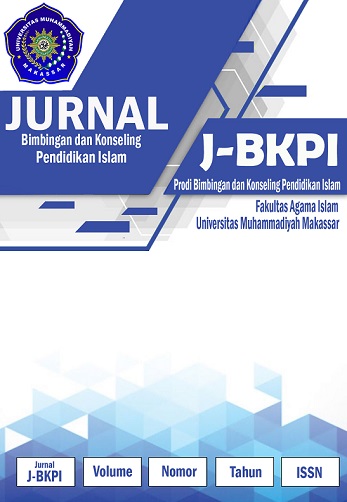GAMBARAN MOTIVASI BELAJAR SISWA SELAMA PEMBELAJARAN DARING
DOI: https://doi.org/10.26618/jbkpi.v2i01.9782
Abstract
Abstact:
Education system in Indonesia is experiencing new challenges due to the Covid-19 virus outbreak, which has caused the entire learning system in educational institutions to be transferred to online learning methods. transferred to online learning system certainly has an impact on learning motivation of student, because students will feel the difference and change in the atmosphere in the online learning process.This study aims to explain in detail how the objective motivational conditions experienced by students in online learning during the Covid-19 pandemic. This study uses a qualitative approach by using non-probability sampling, namely the purposive sampling technique. The results showed that there was a decrease in learning motivation in junior high school students who participated in online learning. Characterized by a lack of desire and interest to succeed in learning; lack of motivation and need for learning; do not understand the hopes and aspirations of the future; lack of appreciation in learning; students have not been able to capture the interesting atmosphere that causes the learning process from home to be meaningful and the learning environment is less conducive.
Keywords: Learning Motivation, Online Learning
References
DAFTAR PUSTAKA
Brophy, J. (2010). Motivating Students to Learn (3th Ed). Routledge, Abingdon-on-Thames.
Dewi Permata Sari dan A. R. Rusmin. (2018). Pengaruh Iklim Kelas Terhadap Motivasi Belajar Peserta Didik Di Sman3 Tanjung Raja, Jurnal PROFIT Kajian Pendidikan Ekonomi dan Ilmu Ekonomi 5. No. 1: 80–88.
Cahyani, Listiana, Larasati. (2020). Motivasi Belajar Siswa SMA pada Pembelajaran Daring di Masa Pandemi Covid-19. IQ (Ilmu Al-qur’an): Jurnal Pendidikan Islam Vol.3 No. 01, hal.. 123-140. DOI: https://doi.org/10.37542/iq.v3i01.57
Emda, Amna. (2018). Kedudukan motivasi belajar siswa dalam pembelajaran. Lantanida Journal 5, No. 2: 172–182.
Izzatunnisa, L.,Dkk. (2021). Motivasi Belajar Siswa Selama Pandemi dalam Proses Belajar dari Rumah. Jurnal Pendidikan: Vol.9 No.2, Hal. 2337 – 7593
John W. Santrock. (2003). Perkembangan Pendidikan. Jakarta: Erlangga.
Keller, J. M. (2010). Motivational Design for Learning and Performance: The ARCS Model Approach. Spinger.
Lee, J., & Martin, L. (2017). Investigating Students’ Perceptions of Motivating Factors of Online Class Discussions. International Review of Research in Open and Distance Learning, 18(5), 148–172.
Nakayama, M., Mutsuura, K., & Yamamoto, H. (2014). Impact of Learner’s Characteristics and Learning Behaviour on Learning Performance during a Fully Online Course. Electronic Journal of E-Learning, 12(4), 394–408.
Nurhayati, Nurhasanah, Dahliana. (2016). Dinamika Motivasi Belajar Pada Siswa Mandiri di SMPN 10 Banda Aceh. Universitas Syiah Kuala 1, No. 2: 73–79.
Schunk, D. H., Meece, J. R., & Pintrich, P. R. (2014). Motivation in Education: Theory, Research, and Applications (4th Ed). Pearson.
Schunk, D. H., & Usher, E. L. (2012). Social Cognitive Theory and Motivation The Oxford handbook of Human Motivation (In RM Ryan). Oxford University Press.
Samir Abou El-Seoud, M., Taj-Eddin, I. A. T. F., Seddiek, N., El-Khouly, M. M., & Nosseir, A. (2014). E-learning and Students’ Motivation: A Research Study on the Effect of Elearning on Higher Education. International Journal of Emerging Technologies in Learning, 9(4), 20–26.
Sanjaya, Wina. (2010). Kurikulum dan pembelajaran, Teori dan praktek Pengembangan Kurikulum KTSP. Jakarta: Kencana.
Sari, Dewi Permata & Rusmin, A. R. (2018) .Pengaruh Iklim Kelas Terhadap Motivasi Belajar Peserta Didik Di Sman 3 Tanjung Raja. Jurnal Profit Kajian Pendidikan Ekonomi dan Ilmu Ekonomi,5(1): 80–88
Uno, H. B. (2014). Teori Motivasi dan Pengukurannya: Analisis di Bidang Pendidikan. Bumi Aksara









